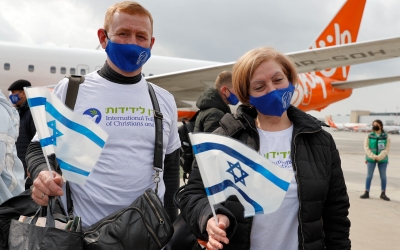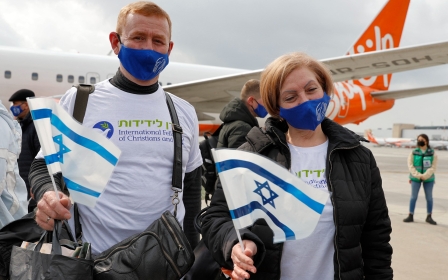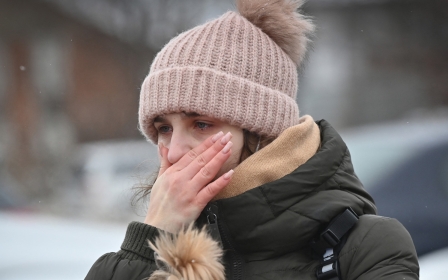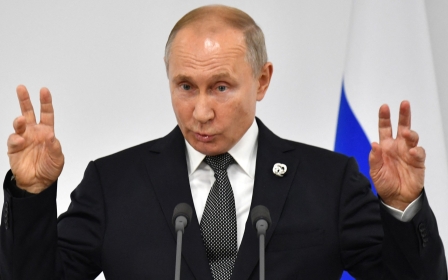Russia-Ukraine war: Tunisian students escape carnage to chaos on the Romanian border
Fedi dreamed of being a doctor, so when he started his first year of medical school in Ukraine's eastern city of Dnipro in January, he never thought a Russian invasion would stop him in his tracks, just three month after he started.
This week, the 19-year-old Tunisian was on a bus that carried him and almost 250 other Tunisians 1,000 km from eastern Ukraine into neighbouring Romania.
He was no longer a student, he was a refugee.
Fedi, who comes from the coastal city of Sfax, was planning on staying in Dnipro for six years. Now he needs to find another place to study and live.
New MEE newsletter: Jerusalem Dispatch
Sign up to get the latest insights and analysis on Israel-Palestine, alongside Turkey Unpacked and other MEE newsletters
“I spent three days awake before we left,” Fedi told Middle East Eye after he arrived at the Siret border crossing between Ukraine and Romania on Monday evening.
“There were air planes going over Dnipro and we were hearing bombs and sirens all night.”
Fedi is just one of the thousands of Arab students fleeing Ukraine into Romania. But, he explained, their evacuation is thanks to just one man: Nadhem Bahri.
Asma, an Algerian student whose parents live in Tunis, arrived with Fedi on Monday evening. She told MEE that she owes everything to Bahri, who organised her evacuation, though she was in contact with the Tunisian government.
Bahri is a Tunisian doctor and the director of Dnipro Service, an educational consultancy that has been helping students from North Africa to apply to universities in Ukraine since 2006.
He told MEE he’s used to managing crises by now. First it was the fighting in Donbas in 2013, then the Covid-19 pandemic in 2020.
“We already had logistical experience to evacuate people from Ukraine,” he told MEE.
Bahri and his team have been in contact with the Tunisian ambassador in Moscow to coordinate the evacuation of Tunisian students from Ukraine.
Embassy envoys
At the Siret border crossing on Tuesday, Chebbi and Obaid, volunteers sent by Tunisia’s embassy in Serbia, were trying to find a new batch of students who were supposed to arrive that morning.
The Tunisian government gathered its staff from embassies across eastern Europe together and deployed them at each border crossing to receive incoming students. The Tunisian embassy in Belgrade was assigned the Siret crossing.
After an hour of looking everywhere for them, the first one arrived. When he entered, Abdullah, a 22-year-old medicine student in his fourth year, was wearing a jacket with a furry cloak and was dragging his luggage as he looked for a familiar face.
The embassy envoys welcomed him as Romanian volunteers offered warm food and drinks.
It took Abdullah 22 hours to get from Dnipro to the border, and he didn’t manage to get a minute's sleep on the way.
“There were so many checkpoints,” said Abudllah. “Every half an hour there was one and they were checking our documents.”
There were only 30 Tunisians in this batch, significantly less than the 250 the night before.
Next through the crossing was 22-year-old Ahmed, who had his right hand in a cast after a crush in the Dnipro metro trapped it in a door.
“The cast is badly done, I need to redo it when I get to Tunisia,” he said.
Next to Ahmed was Yushka, his Yorkshire Terrier, trembling because of the freezing cold. Chebbi took her to the bus, where the new arrivals would soon leave for Bucharest, where charter flights would take them to Tunis.
A group of five Moroccans weren’t as lucky as the Tunisians. Upon their arrival they were confused, cold and tired. Volunteers offered to help them, but they didn’t know what to do and who to trust.
No one from their embassy was waiting for them.
Not going back
Asma, the Algerian student, was still in a state of shock after seeing the Russian invasion turn her life upside down.
“I still don’t accept this situation, this was not easy for us, we’re just students and we moved to Ukraine to study,” she said. “Now we find ourselves in a critical situation, it’s horrible.”
She said that she was a bit disappointed in the university and her government, as they had both downplayed the possibility of an invasion and told them not to worry. Other countries, she said, instructed their students to evacuate much quicker.
The Tunisian government had not responded to a request for comment on its evacuation plan before publication.
Because of the quick evacuation notice, none of the students managed to pack all their bags. They all had one suitcase with the essential things. Neither Fedi nor Asma want to go back when the war ends.
“I don’t have any guarantees that the war will not start again,” said Fedi.
There was some discrimination on the Ukrainian side, the 19-year old Tunisian said, as the authorities didn’t want to let Arab and Indian students leave. But he doesn’t hold it against them.
“They don’t represent Ukrainian people. Ukrainians are very nice,” said Fedi.
In the background, someone shouted in French: “Our university got bombed!"
The news was met with a gasp and relief.
Middle East Eye delivers independent and unrivalled coverage and analysis of the Middle East, North Africa and beyond. To learn more about republishing this content and the associated fees, please fill out this form. More about MEE can be found here.





